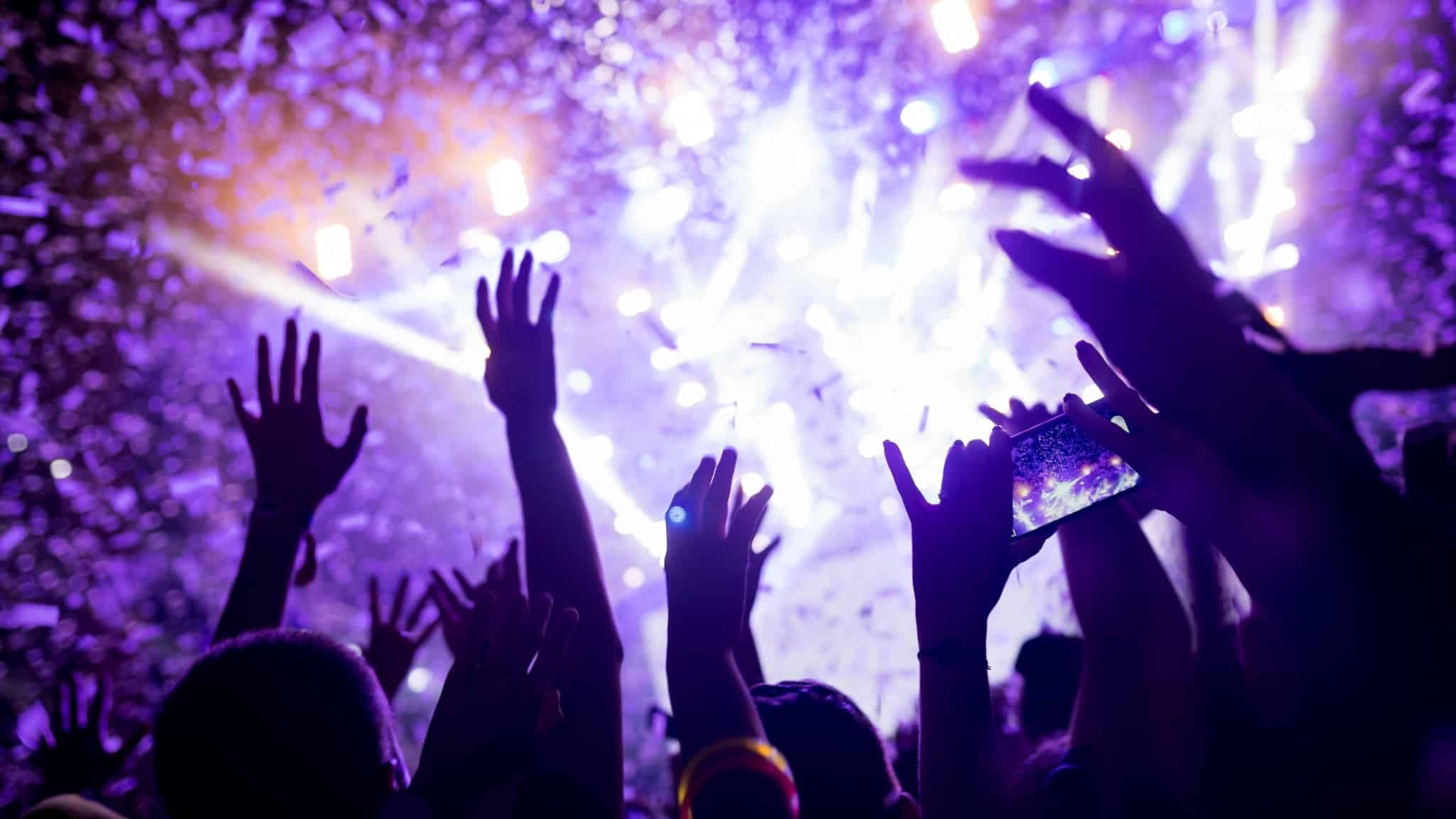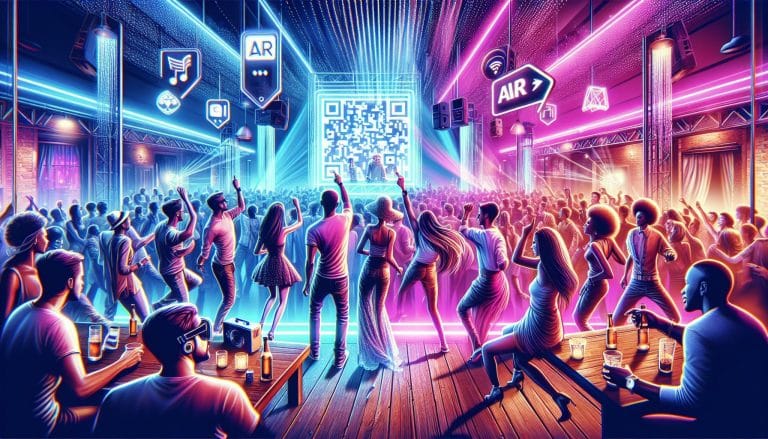For event organizers and promoters, perhaps the most crucial aspect of marketing an event is leveraging social media. Today, with several social media platforms offering a wide variety of promotional tools and strategies, it is easy to see the value of a strong social media campaign for your event.
A good social media campaign is important, whether you’re marketing a local event or a large-scale festival. Over half the global population is currently spread across Instagram, Facebook, Twitter/X, YouTube and TikTok, making social media both an inexpensive and accessible tool at hand. But if you’re here, you perhaps already know this. Or, you’re in the process of putting together a complete marketing plan for your event, and are yet to decide if social media should be a focus for your marketing team.
In this article, we will take you through the basics of a strong social media campaign, leaving you with 10+ tips and things to consider before, and as you draft, your event’s social media marketing plan. Ultimately, your goal is ticket sales, and a successful event.
Let’s help you understand how to create a social media marketing campaign for your event.
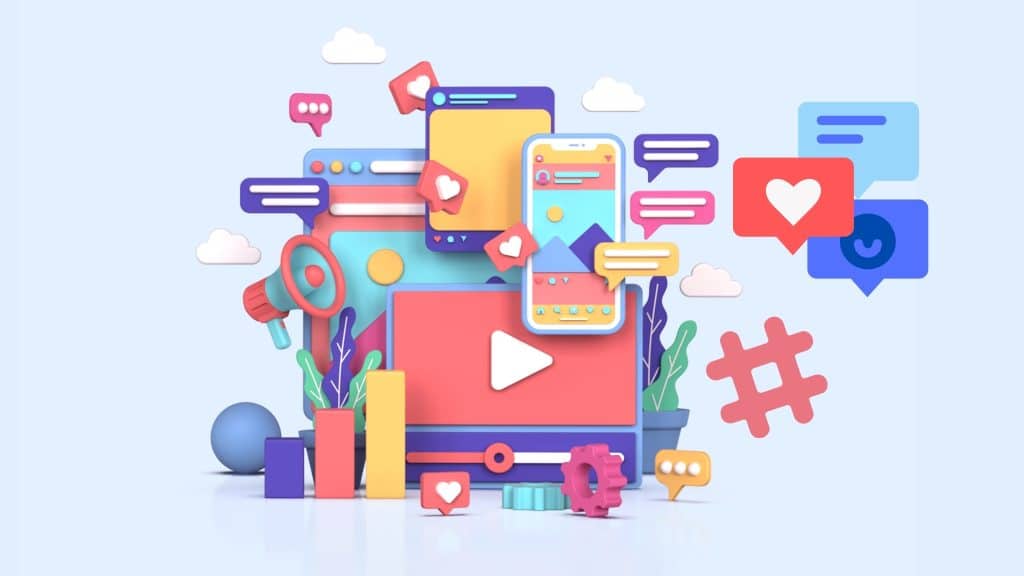
What is a social media marketing campaign?
Simply put, a social media marketing campaign is a series of actionable items that are put together on a schedule, either leading up to, or after, a sale or event. This may look like a well-organized excel sheet for some, and for others, it may be a set of documents and shared folders. It is important to know the ins and outs of your event social media marketing campaign before you begin to schedule it.
Why does your event need a social media marketing campaign?
If your event is for attendees between the ages of 18 and 30, social media is the best place to find them. As opposed to offline marketing, social media marketing can be extremely cost-effective – if you use your tools right! Instagram, for example, offers its users detailed data about their audiences, segregated by age, gender, and more. Twitter/X, on the other hand, is a versatile market to get conversations going, and can be leveraged to success if your event is looking for the right kind of buzz.
With the use of targeted advertising and collaborations, event organizers and promoters are able to not only bring new ticket buyers in, but also hold on to the buzz post-event by further engaging their acquired audience online.
Also Read: How Audience Demographics Help Event Promoters Create Effective Campaigns
In a nutshell, you can find and engage with an audience for your event before, during, and after your event takes place. These are users that will not only relate to your brand enough to opt to see it on their feeds daily, but will also translate directly to ticket sales for your event.
When is the best time to plan and launch a social media marketing campaign for your event?
Too soon, and the buzz you generate will lessen. Too late, and you will miss out on engaging with a large chunk of potential attendees. The best time to launch a social media marketing campaign for your event depends on the following factors:
- Is your event taking place for the first time? Or, is it a recurring event?
- Is your team well-geared up to working towards a fixed deadline?
- Is your event being announced at one go, or in phases?
Once you’ve answered these questions, you will come to understand how much time you have to work with and the team you either already have, or will need to put together, to launch your social media campaign.
For some, this may look like a month’s worth of promotional material, and for others, it may be a year-round requirement. You can also use the tools platforms like Instagram and Facebook provide to schedule posts and reminders in advance.
How to begin creating a social media marketing plan for your event?
Here are three factors to keep in mind before you begin:
1. Finding your target audience
2. Choosing the right platform or platforms
3. Deciding on a duration for your campaign
These factors, while interdependent, each require careful consideration. For example, if your target audience is older, it may be a better choice to focus your efforts on a platform like Facebook or Twitter. Similarly, to target a younger audience, you would choose to opt for platforms like TikTok or Instagram.
If your event ticketing is set up on a platform like Ticket Fairy, audience information is made easily available for you. You can view demographics and geographics in a variety of formats.
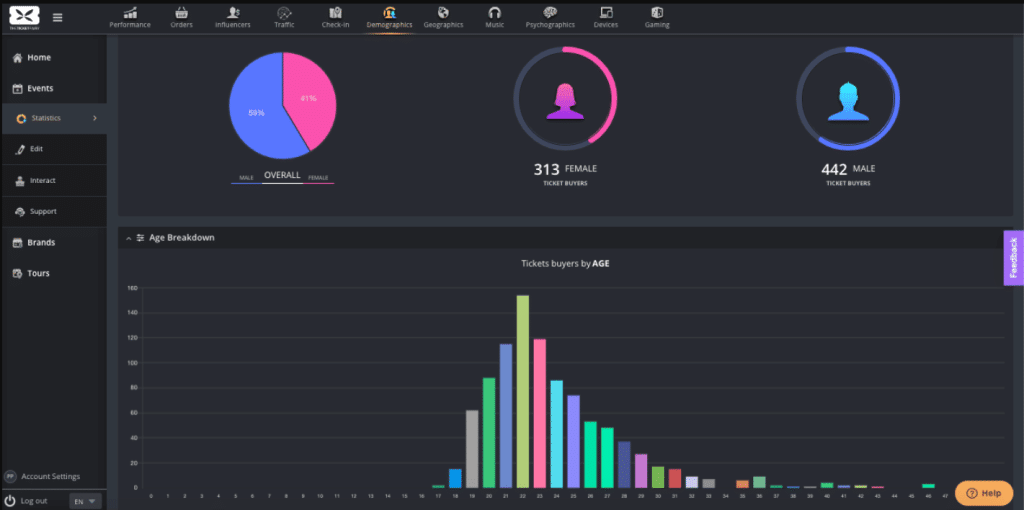
Information gathered from your previous events via Ticket Fairy’s event ticketing system can make identifying your audience a simple task. It can also help you decide upon specific social media platforms to target, or aspects of your event to advertise, based on the success of your prior events and the knowledge you have about your past event attendees.
Read More: Ticket Fairy: An Event Promoter’s Platform
While these three factors are not set in stone, they are important to consider and generally apply to the platforms mentioned above. Knowing your audience will not only determine where your resources are best spent, but will also help you decide on the duration of your campaign or how much prior to the event your promotions should begin.
On the other hand, if you are already aware of a timeline to follow, the two other factors mentioned become key to kickstarting your social media campaign plan. Setting these factors as guiding baselines, let us now look at what your social media marketing campaign should include.
10 Things To Include in a Social Media Marketing Campaign For An Event
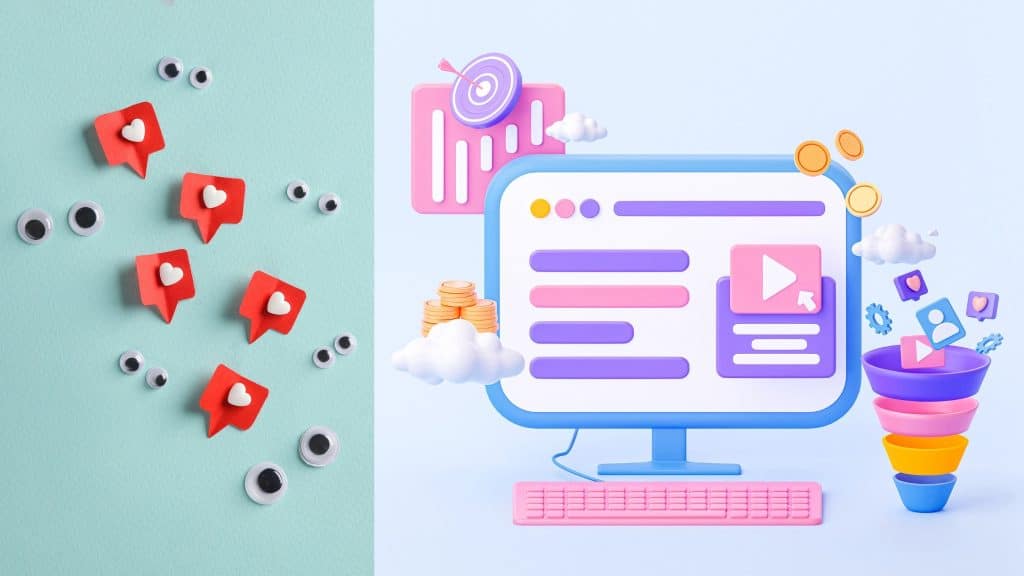
1. Your Event Social Media Plan Needs Media
In the digital age, it is imperative to understand that your audience can be fleeting if not marketed to the right way. And in a visual media rich environment such as social media, any media you share can benefit your event and boost ticket sales.
This is not to say that you should immediately and solely focus on gathering as much visual media as possible to begin posting online. It should get you to think about what factors of your event could benefit from being visually represented.
Also Read: 10 Essential Types of Online Content to Attract Ticket Buyers to Your Music Festival
Is your concert venue state-of-the-art? What is the line-up of performers for the event? Are there any other interesting initiatives or activities taking place at your event? What is the location around your event like? Ask yourself these questions and begin thinking about the images and videos you need. Think about the videos that should stay visible to your audience both during and post the event, and ones that are better for sneak-peak moments. Consider getting professional editing done for media you think will work well with your audience.
2. Collaborate with Influencers
Identify your audience and the circles they engage with, and use this to your event’s advantage. Find relevant prominent figures that would not only attend your event, but would also be available and willing to talk about it online. This could be anything from a post on Twitter/X to a reshared image on Instagram. Your goal is to get the conversation going, further driving potential attendees to your page to engage with your posts, and ultimately converting them into ticket buyers.
3. Find and Collaborate With Sharing Partners
Based on the type of event you’re organizing, or its geographic location, you can conduct research to find pages that are targeted towards promoting events of a certain type or in a particular region. For example, an independent blogger on Instagram that posts about and frequents electronic music events would be your ideal option to draw audiences to your social media page or ticketing site.
If you’re organizing a large-scale music festival, identify pages that discuss and post about music festivals; if your event is based in a tourist hotspot, target travel influencers based on the location of your event. You can then collaborate with several similarly-aligned pages to further boost the buzz surrounding your event.
4. Create A Hashtag For Your Event
Considering their multi-platform relevance, hashtags are a quick but noteworthy way to get eyes on your event. Consider a custom hashtag that frames the name of your event in a positive and exciting light, and use it across your posts and those of your sharing partners. Further leverage the hashtags you create if you plan to organize contests, which brings us to:
5. Consider Running Contests To Boost Engagement Online
You may have come across contests online several times, that require you to provide an email address to participate. Or, on Instagram, a post that asks you to like, share, and comment in order to participate. Consider your requirements and goals and decide on a prize accordingly. This may be free tickets to your event, or custom merchandise for your event or a performing artist.
Social media platforms offer several ways to market your product, and some also provide you with an in-built marketplace for buyers on the platform. Use the tools provided to finetune your contest and its mechanics to ensure a smooth process for participants, and watch the engagement rise!
6. Use Targeted Marketing and Paid Advertising
You can either set the parameters for your audience, or allow platforms like Instagram to intelligently map these out for you. Targeted Marketing is often a cost-effective way to promote your content online, and the same applies to that of your event.
Also Read: Take Your Event Promotion To The Next Level With A Multi-Format Instagram Strategy
Be sure to edit your images and videos to be immediately attention-grabbing, while delivering the intended information. Decide on whether it is best to circulate your event line-up, ticket prices and stock and/or exciting clips from past editions of your event. Use these assets to target potential attendees in the regions that are best. You can use targeted advertising for just about any aspect of your event!
7. Leverage the ‘Live’ Aspect of Social Media
This could be anything from hosting a Q&A with relevant prominent figures during the days leading up to your event, to livestreaming as your event takes place. There is a large audience that finds appeal in the ‘live’ aspect of social media, and will tune in out of curiosity, but are guaranteed to stay and convert into attendees if your live video delivers the information it needs to.
Here, it is important to understand the timing and frequency of livestreaming to both gauge whether your audience responds well, or tweak the flow of your livestreamed content to boost viewership.
8. Take Over A Relevant Social Media Profile Or Let Your Profile Be Taken Over
A direct way of engaging with another profile’s audience, takeovers can be particularly beneficial to both participating parties. Look into whether a performing artist on your line-up would like to take over your Instagram account for the day, or have one of the artists make posts on your Twitter/X during your event, recapping their thoughts live. You could also take over a sharing partner’s account for a day or an agreed upon number of hours and make posts or go live!
9. Start a Trend
It doesn’t just have to be a hashtag or contest that makes the rounds on social media. Maximize your reach by trying your hand at creating a trend for your event. This could be anything from an appealing video transition or format, an audio by one of the performing artists at your event, or even a custom filter on Instagram!
Also Read: How To Create And Plan Stellar Content For Your Event
The goal is to engage your audience and potential profile visitors and ticket buyers to participate in something fun that others are doing. You may even engage influencers and performing artists to participate, in-turn enticing more participants.
10. Keep The Momentum Up With Post-Event Promotions
Once your event has taken place, you should consider posting snippets and clips taken during the event to engage attendees and those that could not make it. Share memorable moments; ask attendees to comment or directly message your account with their experiences, and share them forward in neatly-created posts. If your event will return or repeat, having an active social media presence is a strong way to keep your audience’s attention.
Also Read: 5 Essential Pre-Event Digital Strategies Guaranteed To Engage Your Audience
Ultimately, your social media marketing campaign will not only directly contribute to the success of your event, but also to your brand’s online success and visibility. Your plan should consist of all the selling points of your event, and should package them in a scheduled and easy-to-consume set of plans and strategies.

Here are some key things to consider as you draft your event’s social media marketing campaign:
Be Consistent. Timing and consistency directly contribute to your engagement, so make sure to plan and schedule all your campaign assets in advance to keep the momentum going and keep your audience’s attention.
Use social media tools efficiently. Identify what platform your campaign needs most and prioritize using the tools the platform provides. This may include, for example, using Instagram’s ‘Reminder’ feature to announce phases of your line-up announcements, or creating a Facebook event page of your event to circulate on the platform.
Advertise your event’s strengths. If your event page is well-designed, draw attention to by frequently posting your event page link across your social media pages. If the check-out process to buy tickets to your event is seamless, consider dedicating a post to inform your audience of this.
Prioritize the ‘Sale.‘ Keep your audience and potential ticket buyers in the know about ticket stocks. Make frequent announcements as sales take place, and inform your audience if a particular tier is close to selling out or no longer available. Direct them towards new stock, and keep the updates frequent, and across all your social media platforms to ensure all potential buyers can be made aware.
Also Read: How Event Organizers Should Prioritize Learning Detailed Audience Demographics
A strong social media marketing campaign for your event should be a meticulous mix of your event’s identity and the platforms you are broadcasting to. With the key tips and ideas you have found in this article, creating an effective strategy for your event should be both organized and exciting.
For strategies on how to sell out your next music event or music festival, download our free cheat sheet: 5 Secrets of Successful Organizers Who Sell Out Events
You May Also Like:
How To Create An Effective Event Marketing Plan For Your Music Festival or Concert
5 Important Strategies Every Promoter Should Implement To Bolster Audience Interest
10 Aspects Of Event Planning Every Promoter Should Check In On
